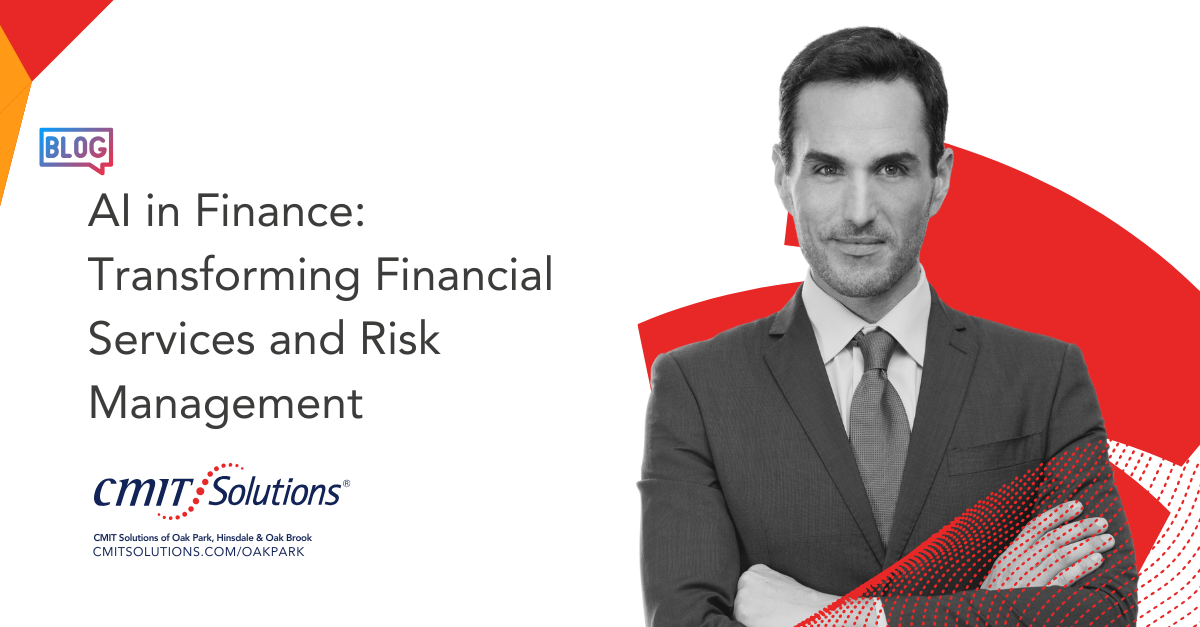Introduction: Finance Meets Intelligence
Artificial Intelligence (AI) is rapidly transforming the global financial services landscape. What once relied on spreadsheets and human intuition is now being reimagined through predictive algorithms, automated processes, and real-time data analytics. For progressive organizations like CMIT Solutions of Oak Park, Hinsdale & Oak Brook, embracing AI in finance is not just about efficiency—it’s about innovation, compliance, security, and strategy.
Whether it’s fraud detection, investment analysis, or customer service, AI is empowering financial institutions and small businesses to make smarter decisions faster. But as adoption grows, so does the importance of ensuring ethical, secure, and scalable implementation.
The Rise of AI in Financial Services
The finance sector is one of the earliest and most aggressive adopters of AI technologies. From robo-advisors to algorithmic trading platforms, AI is making transactions faster, insights sharper, and services more personalized. Leading use cases include:
- Credit scoring and loan underwriting
- Customer service chatbots and virtual agents
- Automated wealth management
- Regulatory compliance monitoring
- Fraud detection and prevention
These systems learn from historical data, respond to current patterns, and predict future risks, revolutionizing how firms manage both opportunity and uncertainty.
Core Benefits of AI in Finance
AI offers both operational and strategic advantages across the financial value chain. Among the top benefits:
- Real-time analytics: Enables instant decision-making on trading floors, underwriting, and portfolio shifts.
- Enhanced fraud detection: Identifies anomalies and blocks suspicious activity before damage occurs.
- Improved customer experience: Chatbots and tailored services reduce wait times and increase satisfaction.
- Cost efficiency: Automates repetitive tasks, freeing human resources for higher-level strategy.
- Predictive risk modeling: Anticipates market shifts, credit defaults, and regulatory exposures.
These benefits align with strategies for boost productivity and optimize operations while reducing financial risk.
Revolutionizing Risk Management
Risk management is one of the most critical domains AI is transforming. With AI, companies can:
- Analyze millions of transactions in seconds
- Detect subtle market changes and economic shifts
- Forecast asset volatility
- Run stress testing simulations in real time
Traditional risk models depend on static data and assumptions. AI-driven models, however, continuously learn and update. For instance, insurers can now use machine learning to refine underwriting models and assess claims more accurately. These advancements require strong data backup and storage infrastructure to ensure reliability.
Fraud Prevention and Cybersecurity
AI excels at identifying fraudulent behavior by analyzing user patterns and flagging unusual activities. Machine learning algorithms detect fraud in:
- Online banking transactions
- Credit card purchases
- Loan applications
- Wire transfers
These capabilities are essential for protecting customer trust and business assets. Combined with a multi-layered security approach, AI-powered fraud detection strengthens an institution’s cyber posture.
Additionally, integrating AI tools with SIEM solutions enhances incident detection, response times, and resilience against evolving cyber threats.
Financial Forecasting and Business Intelligence
AI provides powerful forecasting tools for CFOs, analysts, and advisors. These tools:
- Aggregate structured and unstructured data
- Predict revenue, expenses, and cash flow
- Spot trends in customer behavior and market sentiment
This allows businesses to plan with greater precision and agility. AI-enhanced forecasting also complements business intelligence tools, integrating dashboards, visualizations, and dynamic analytics into strategic planning.
AI-Driven Compliance and Regulation
Navigating complex financial regulations like GDPR, SOX, and Basel III is a growing challenge. AI simplifies compliance through several key capabilities:
- Automated transaction monitoring
- Digital audit trails
- Natural language processing for regulatory texts
- Real-time alerts for breaches
These tools reduce human error and improve audit readiness. As explored in our compliance challenges blog, such automation supports proactive rather than reactive compliance.
Unified Communications in Financial Services
Effective financial services depend on streamlined communication between departments, clients, and regulators. AI-driven tools integrate messaging, email, chatbots, and virtual meetings into unified communication platforms. These systems ensure secure, documented, and fast exchanges of information.
Virtual assistants also help internal finance teams by scheduling reports, sharing key metrics, and providing voice-activated access to performance data.
Cloud Services and IT Infrastructure
AI applications require powerful computing capabilities and scalable data environments. This makes cloud services essential for financial firms. Cloud platforms enable:
- On-demand AI processing power
- Secure storage of financial data
- Integration with third-party AI tools
- Remote access for distributed teams
At CMIT Solutions of Oak Park, Hinsdale & Oak Brook, we design cloud-first infrastructures that support AI scalability and compliance.
IT Procurement and Strategic Guidance
Investing in AI is more than purchasing software—it requires thoughtful planning, integration, and governance. Our IT procurement services help financial firms:
- Evaluate AI solutions for performance and compatibility
- Manage vendor relationships
- Align procurement with business goals
Through strategic IT guidance, we empower organizations to modernize securely.







